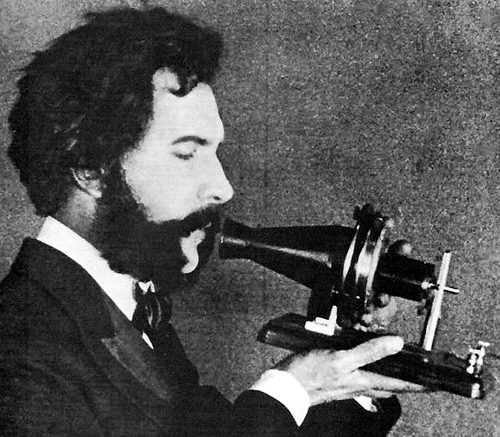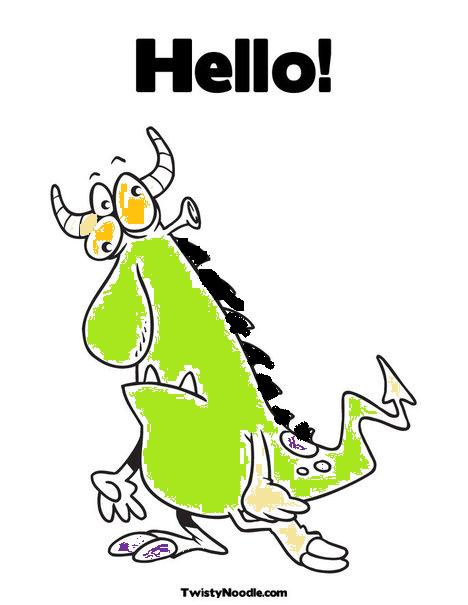| The IndUS Network | e-magazine |
Tale
of Telephone
|
||

Image credit:Early office museum
| Alexander Graham Bell demonstrates speaking into a phone
using his model
|
Ever since Thomas Edison introduced this word “hello” it has been used worldwide to start a conversation effortlessly. Its questioning nature soon became the first word of choice to answer a telephone ring. Let us also know about the telephone which carries this “hello” through the length and breadth of the earth.
Tele-phone literally means far-voice.
Breakthrough in Communication
Alexander
Graham Bell invented the telephone and a patent was issued for his
invention on March 7th 1876.
Basically, telephone is an instrument that converts sounds/voices
to electrical impulses of various frequencies and then back to a
tone that sounds almost like the original voice at the receiver’s
end.
On March 10th, 1876, the first words were spoken over the telephone when Bell called his assistant Thomas Watson in another room, "Mr. Watson, come here; I want you" and Watson heard it through his receiver. Thus the first complete sentence was spoken over the telephone.
Birth of the Telephone
Graham Bell was already an expert in sound and speech and was helping his father with “visible speech” an aid for the deaf. In the 1870s, electricity offered a great opportunity to youngsters towards inventions in that field. Telegraph or message transmitted by intermittent current was already popular, but the need for transmission of multiple messages or multiple telegraphs was felt and Bell realized that to transmit sound, a continuous electric wave was necessary and worked on “harmonic telegraph” to transmit multiple messages by using musical notes of varying frequencies. Finally, he used a liquid transmitter with an electrical circuit and succeeded with the voice transmission. The invention of microphone in 1876 by Emile Berliner quite improved the telephonic voice transmission.
The invention became a massive success and some other inventors also claimed credit of the invention of telephone, like Antonio Meucci, Philip Reis, and Elisha Gray, though only Bell succeeded in creating a workable transmitter.
Then comes the history of Bell’s founding the Bell Telephone Company (later AT&T), which grew to be the largest telephone company in the world.
How sound is transmitted?
When we speak on the mouthpiece sound waves pass through the transmitter via the diaphragm. It vibrates corresponding to the air pressure created by the speaker’s tones. The diaphragm presses against tiny carbon grains and low-voltage current flows through the grains that comes from the battery of the telephone company. The pressure on the diaphragm decides a stronger or weaker electric current.
How sound is received?
When the electric current reaches the receiver, it passes through a coil surrounding an electromagnet that makes the diaphragm vibrate strongly or weakly according to the speech pattern and the diaphragm sets up an air pressure that in turn sets up the sound waves that strike our ears.
Growth of the Telephone System
The voice transmission system has undergone a rapid growth going from copper wires to optic fibers as well as from older dial-type phones to digital ones. The earlier wired phones were bulky and expensive. Then the wireless technology emerged. But, the wireless technology had a limited range. So, research was taken up in providing greater mobility for the telephone and to reduce its size considerably. Thus, emerged the mobile phones or cell phones or cellular phones, quite a revolution for this talk-gadget. So, the telephones escaped the boundaries of the home right into offices, classrooms and markets. Today, mobile phones have become indispensable in our lives and as we can see technology revolution is taking place at a breakneck pace. See the various form your future phones can take in this video: Future Hello-2010-2014.
Dinner? I will be right over ...
 The
neighbor was on the phone, "Hello? I'm not interrupting your
dinner, am I?"
The
neighbor was on the phone, "Hello? I'm not interrupting your
dinner, am I?"
The resident retorted, "Actually, you are."
The neighbor quipped, "Oh, Good. Wait for me, and I'll be right
over!"
* The characters, settings and happenings are fiction only.
No part of this magazine must be copied or published without explicit written permission.